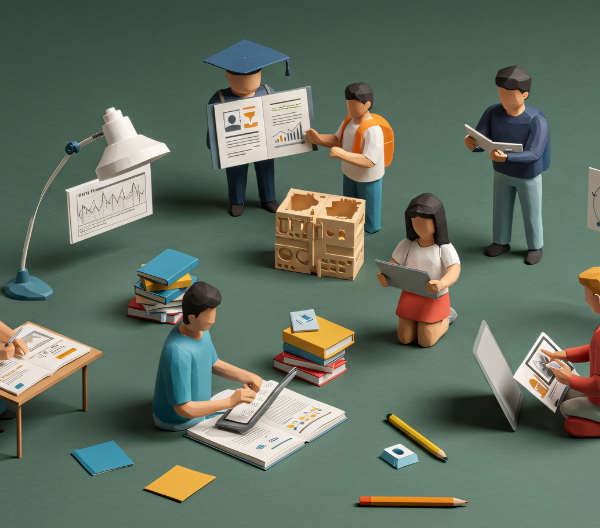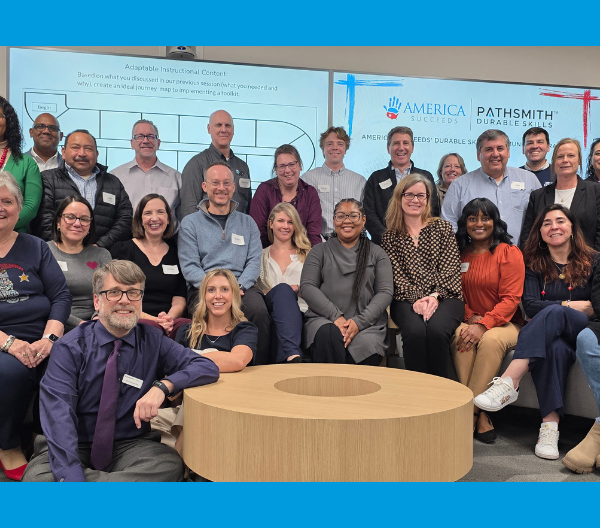Submitted By Todd Macadangdang
A seasoned EdTech leader with 20+ years of experience, Todd has consistently delivered innovative web-based solutions for students and educators alike. With a rich background at Adobe Systems and Simon and Schuster, Todd holds invaluable insights for thriving in the corporate world. Additionally, consulting for clients like Mattel, Disney, and National Geographic, and leading a startup based in Norway, Todd understands what it takes to thrive in an innovation economy. Now, as lead durable skills trainer and program director at MindSageAcademy.com, he shares his wealth of expertise to empower students for success in the workplace and life.
As a Project Manager with experience in corporate, small business, and startup environments, I was impressed by America Succeeds Durable Skills Framework It offers clear guidance to educators on the durable skills needed for success in today’s job market, which employers demand.
Billions are spent annually by corporations on soft skills training for employees, revealing a gap in education. The growing focus on helping students develop soft skills or durable skills before graduation will be a huge step forward towards completing that bridge between the classroom and the workplace.
Not New To Employers
For decades now, employers have clearly defined the needed soft skills for workplace readiness, as evidenced by the numerous articles available online discussing the soft skills employers seek in new hires. Just Google ‘soft skills’ and ‘students,’ or ‘graduates,’ to see how many years employers have been noticing a lack of soft skills in graduates.
Educators have also recognized the increasing demand from employers for graduates with durable skills or soft skills training.
In 2019, Walden University published an article entitled ‘Soft Skills Needed for the 21st-Century Workforce.‘ In 2018, the National Bureau of Economic Research published a report on ‘The Value of Soft Skills in the Labor Market.’ But higher education has known the importance of soft skills for even longer.
In 2013, Southeastern Oklahoma State University produced ‘Executive Perceptions of the Top 10 Soft Skills Needed in Today’s Workplace.’
As far back as 2012, Eastern Kentucky University produced a paper entitled ‘Executive Perceptions of the Top 10 Soft Skills Needed in Today’s Workplace.’ Those just scratch the surface of papers written by educators.
From the National Soft Skills Association: “Research conducted by Harvard University, the Carnegie Foundation, and Stanford Research Center has all concluded that 85% of job success comes from having well-developed soft and people skills, and only 15% of job success comes from technical skills and knowledge (hard skills). These statistics were extrapolated from A Study of Engineering Education, authored by Charles Riborg Mann and published in 1918 by the Carnegie Foundation. The cited figures come from the data on pages 106-107. That is not a typo, it is correct—1918. So we have known for almost 100 years that soft skills are critical to the success of any organization.”
The US Department of Labor has even produced a document titled “Mastering Soft Skills for Workplace Success” here. These are just a few examples of the awareness of the need to empower students with durable skills.
If employers and educators have long known about the need for graduates to possess and demonstrate soft skills, why aren’t they a required part of our school’s curriculum? Or, the better questions might be, are soft or durable skills being taught in your school, and if not, why?
Which Durable Skills Should Be Taught?
One of the first issues is determining which durable skills should be taught in the classroom. Another obstacle is that the focus on developing durable skills for students has often been overshadowed by the emphasis on preparing them for standardized testing. Moreover, unlike academic subjects, which often rely on rote memorization, durable skills necessitate transformational learning. Because of this, assessing the effectiveness of a durable skills program presents its own set of challenges.
AmericaSucceeds.org has effectively addressed the first two challenges. Their published study has significantly raised awareness of educators to the critical need of providing students with durable skills training before they enter the workforce. Additionally, they’ve developed a Durable Skills Framework to suggest which durable skills could be integrated into the classroom.
Their Framework was developed through consultation with over 800 businesses and organizations nationwide. It’s no surprise that our program at MindSageAcademy.com aligns with their Framework, given that our program was developed by working professionals, tested and proven in real time, in the workplace.
Before we name the durable skills listed in AmericaSucceeds.org’s Durable Skills Framework, let’s just consider what others have suggested in the past.
As early as 2013, Tony Wagner, a former teacher and Senior Research Fellow at the Learning Policy Institute and Expert in Residence at the Harvard Innovation Lab, listed the following after his exhaustive research. In no particular order:
- Critical thinking
- Problem solving
- Collaboration
- Leading with Influence
- Agility
- Adaptability
- Communication, both oral and written
- Accessing and Analyzing information
- Curiosity
- Imagination
The most important soft skills in 2024 according to LinkedIn are:
- Communication
- Customer Service
- Leadership
- Project Management
- Management
- Analytics
- Teamwork
- Sales*
- Problem-Solving
- Research
*These skills are comprised of a number of durable skills.
Harvard Business Journal lists these five:
- Effective Communication
- Teamwork
- Influencing without authority
- Problem-solving
- Leadership
Additionally, there are lists of soft skills tailored to specific professions. For instance one website lists the following for Business Development and Sales:
•Communication
•Persuasion
•Responsibility
•Confidence
•Resilience.
For Creative & Digital Media roles, it lists:
•Collaboration
•Feedback
•Time Management
•Lifelong Learning
And for customer service roles they list:
•Discipline
•Clear communication
•Empathy
• Active listening,
Forbes, a magazine that provides the latest insights in finance, industry, investing, marketing, technology, communications, science, and law lists 11 key durable or soft skills. They are:
-
- Communication
- Leadership
- Teamwork
- Creativity
- Time Management
- Adaptability
- Problem-solving
- Work ethic
- Critical thinking
- Conflict management
- Emotional intelligence
Some of the durable skills listed by Forbes are multiple individual skills. For instance, in the Forbes article, Creativity is broken down into Brainstorming, Imagination, Curiosity, and Experimentation. Similarly, Adaptability encompasses flexibility, resilience, a growth mindset, and analysis.
This is very similar to what America Succeeds has done with their durable skills wheel. Under each of their 10 core durable skills they have identified, there are a subset of related traits, qualities, mindsets, attitudes and habits. The core durable skills within the Durable Skills Framework are:
-
- Leadership
- Character
- Collaboration
- Communication
- Creativity
- Critical Thinking
- Metacognition
- Mindfulness
- Growth Mindset
- Fortitude
As you review the lists above, note how certain durable skills frequently appear on multiple lists, with some consistently ranking in the top five. We used this method to identify our initial core list of durable skills. We compiled soft skills lists from over 130 organizations, companies, colleges, and universities, and identified a list of 15 core durable skills that consistently emerged as top priorities across multiple sources. You can view our growing lesson library here, or try out a lesson here.
Imperative Insights to Durable Skills Training
However, as we started implementing our program with interns in our company, we gained two additional important insights: 1) there is a recommended sequence for effectively helping students develop durable skills, namely starting with three foundational durable skills of self-awareness, self-appreciation and self-acceptance, and 2) a successful program must include lessons that identify negative qualities, traits, mindsets, habits, and attitudes inadvertently developed in school. Without making students aware of the inadvertently negative traits, qualities, and habits they have developed in school, these may hinder them from developing the necessary durable skills.
Lessons addressing these two insights are a key part of the Catalyst durable skills training approach we use at MindSageAcademy.com, and in our opinion should be included in any core durable skills training program. Ignoring these two seemingly minor points can significantly impede your students’ abilities to develop specific durable skills, as we have witnessed numerous times in our internships with college and high school students.
For example, many of our participants have told us that they found it difficult to share their ideas (collaborate), felt that their ideas had no merit (innovate), or did not believe in themselves and their abilities to perform at a high level (self-esteem, growth mindset), all because they did not possess the three foundational durable skills mentioned above. Focusing on developing self-awareness, self-appreciation, and self-acceptance is more important than you can imagine for empowering students to transform, develop durable skills, and make long-lasting changes to how they think and act.
Innovate to Teach Innovation
Albert Einstein said, ‘You cannot solve a problem with the same mind that created it.’ To me, this means that we can’t approach teaching students how to develop soft skills with the same methods we currently use in schools to prepare them for the workplace. An effective durable skills program can’t simply be taught as just another subject in school. To truly learn and develop durable skills, students will need to be given freedom to make decisions, and work in settings and environments that more closely resemble the workplace. Schools that include project-based learning and capstone projects in their durable skills programs have the right idea. Schools that integrate durable skills programs with internships to teach and apply durable skills training also have the right idea. We combine both for the ultimate impact on participants.
Harvard Business School Professor, Clayton Christensen, the architect of and the world’s foremost authority on disruptive innovation, made the point that when a completely new approach, solution, or technology is needed to keep up with advancement, smart companies don’t develop internally. IBM, for example, created a completely new business entity that worked outside the realm of the company charters and core organization to determine how best to adapt their business to the sudden rise of the personal computer. They needed the autonomy to consider what would be the best direction or solution moving forward, without trying to justify or be concerned with how it adhered to current practices, customs, or objectives. They need the freedom to create from the ground up, rather than try to make existing pieces fit into a new mold. I believe schools can learn from this approach.
As an educator, consider collaborating with outside organizations that specialize in training young adults for the workplace when implementing a serious durable skills professional training program. Don’t just teach it as another subject.
There are already organizations that will handle all the technology, hardware, and software concerns of a school or district. Schools rely on other service providers for record-keeping or communication between students, teachers, and parents. There’s no need to reinvent the wheel; take advantage of organizations that already have a proven, transformative, corporate-level durable skills training program for young adults ready to empower your students.
Ultimately, helping your students cultivate durable skills will be invaluable not only during their time in school but even more so after they graduate and enter the real world. By prioritizing the development of these essential skills, no matter which program you choose, you ensure a brighter, more secure future for your students and earn the gratitude of their future employers. Your foresight will leave a lasting legacy.

Join us in showcasing practical applications of Durable Skills! Submit your work to be featured on our blog.




